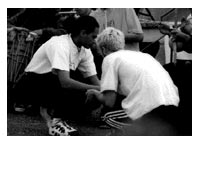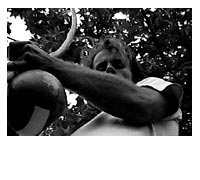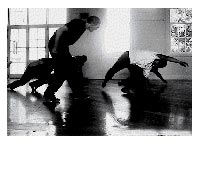 |
 |
| Home | Our Capoeira | Classes | Events | Resources | Contact Us | Message Board |
Capoeira
Our core philosophy

Practiced in an atmosphere charged with percussion and song two players out-move each other, they flow over and around each other weaving kicks and other attacks in constant dance-like motion. They tease and taunt each other and frustrate each others tricks. They joke and jibe with theatrics but are always on the lookout for that sudden attack. Capoeira commands respect and camaraderie among diverse people yet trust is not a virtue. Receiving your friend's blessing has more than one meaning.
Capoeira is a fighting art and a dynamic performing art. It is a vigorous sport and casual recreation. It is an art of powerful African-Brazilian percussion and song. Capoeira mixes fight and play, co-operation and confrontation, gymnastics and theatrics, malice and playful taunting, percussion and song into a dynamic cultural expression.
... and who is this Capoeira Pasifika Mandinga?
Capoeira Pasifika Mandinga is in its 12th year.
It was initiated by Grant Cole (Professor Brabo) and built by a growing group of dedicated students. We are part of Capoeira Mandinga (Mestre Caveirinha) and come from the lineage of Mestre Suassuana and Grupo Cordão de Ouru. We hold proud to that heritage hold on to the norms and protocols of capoeira that Mestre Caveirinha has taught. Brabo was taught by Marcelo for six years before he returned to Aotearoa/New Zealand in the early 1990's.
Classes were set up to plant Capoeira here and have slowly grown since. Brabo's classes are in Auckland but there are now classes being taught by students in Wellington, Hamilton, Mt Maunganui, Nelson, Christchurch an Dunedin who above all want someone to play Capoeira with.

The name Pasifika Mandinga has its own history. Initially it was just Pasifika, mainly to establish the identity of Capoeira in the Pacific. Recently we changed the name, adding Mandinga and Aotearoa for various reasons.
Pasifika situates our Capoeira. We are in the Pacific and the name Pasifika is a generic Polynesian word used a lot around here referring to our region and the cultures within it.
The people practicing Capoeira here have mainly grown up in the Pacific with our own histories. We have our own colonial past, cultural legacies, prides and disgraces that do not directly relate to the Brazilian experience, yet we can and do relate to Capoeira.
However the main reason for making a point of the name is to encourage serious students to think about what it means to do Capoeira here in Aotearoa/New Zealand, to escape the identification of Capoeira as an exotic dance to be experienced and definitely to discourage students from mimicking the Brazilian thing or trying to be more Brazilian than the Brazilians! Capoeira has to mean something to the self, it has to touch the soul and feed the mind. Then when you do Capoeira you bring yourself, your life into the Capoeira world. In one way or another we express ourselves through Capoeira, we express our lives through Capoeira.

We do not express other people's lives through our Capoeira. Capoeira can take hold of your insides whether you're Brazilian or not and you put into it the mandinga that you have. The mandinga that you have is the only thing that brings your vadiagem, your jogar, your chamada, YOUR Capoeira to life. For most of us here that mandinga was born, fed and developed in the Pacific and our Capoeira will inevitably reflect that. It needs to for it to be a live art form. Pasifika more than names the place where our group is learning and practicing Capoeira.
Its intention is to make us dig into the questions of who we are and what relationship we are building by practicing Capoeira in the Pacific. What are we doing? What are we exploring in the practice of Capoeira? Are we merely trying to mimic the cultural expressions of another society or is there something within Capoeira that diverse people around the world identify with? We want students to think about these things when they seriously practice capoeira.
Jogar (to play) and vadiar (to fool) are central to the capoeira that is practiced in Capoeira Pasifika Mandinga. This does not mean we are not serious nor do we ignore the fight (but usually you don't want to go there, bro).
These terms set the intent and atmosphere of our capoeira rodas and how we relate to each other. There is no doubt that the players are trying to out wit and out smart each other. The attacks are aimed, the defences are necessary but the intent should remain focussed on the beauty of Capoeira movement, the comraderie between players and helping each other fight the battles outside the Capoeira circle.
Violence is not tolerated but there is a healthy level of volatility in our rodas... and beware that friendly smile!
Like any Capoeirista anywhere Pasifika Mandingeiros hide their malicia behind their friendly faces, they are maliciosos and cabe?eiros and their "blessing" is not the best thing to recieve.
The music is a major part of the art form. It is not simply music to accompany the physical play. There can be no capoeira roda without music. The Capoeirista must have the music in their body, must be able to jogo and listen for changes in the music. There is no musician section and player section.
If you are a Capoeirista you play music and with it create the atmosphere for the capoeira and the roda to come to life. As much effort goes into learning the musical as is applied to the physical. Singing is vital and bold choruses create a live and exciting atmosphere. Various songs tell the history of Capoeira or symbolise Capoeira traditions while some are simple jingles. The more vibrant and strong the singing, the more dynamic the roda. If the music begins to lull the atmosphere the roda gets slack.
Classes are designed to develop a broad understanding of Capoeira. Some classes are focussed on one aspect or another. Other classes have a broader focus. Students practice the music, working with the different percussion instruments, learn basic rhythms and learn responses to some of the songs. The physical interaction of the art is based around the motion of the ginga and the moving around the floor on hands and feet. Basic movement, kicks, escapes and gymnastics are taught mainly from sequenced movements.
The theatrical, the playing and fooling around is picked up by watching the antics of other studentsƒ and we've got some real clowns. However the focus of our roda is to play strong, dynamic, fun games of Capoeira in an atmosphere of powerful music and song.